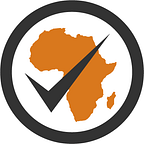Fact-checking’s real world impact — from land disputes to fake donations
Since 2011, when authorities in Cote d’Ivoire sold off 11,000 hectares of land around Famienkro in central Cote d’Ivoire to a foreign-owned agricultural business, the local community has been divided.
One group, led by a local chief, supports the project and insists the land sale was properly agreed. The other, led by the local king, argues it was never approved. At the height of tensions in July last year, two people died, several people were jailed and, still today, the community is deeply divided.
Told about the dispute, journalist Anderson Diedri, one of the winners of the 2016 African Fact-Checking Awards, decided to investigate the government’s claim to have legally acquired the land, searching through mounts of documentation.
When he published his report earlier this year, the government’s claims were rated false. Last month, his report was taken up by the official body that advises the government on land disputes — a common cause of community tensions in Cote d’Ivoire. The body now hopes it will help them finally resolve the conflict.
“The government had clearly misled the local people. This case shows how important it is that we, as journalists, start to fact-check the claims officials make and not simply report them,” Diedri said after picking up his award.
The other winning report, by Arison Tamfu, editor of the Cameroon Journal, checked a minister’s claim that Cameroon’s President Paul Biya was providing a personal gift of laptops to every university student in the country.
His investigation found the devices proposed were sub-standard, were not proper laptops, and were not a personal gift of the president but acquired by the government with a loan from an overseas bank that Cameroon’s tax payers would have to repay. After Tamfu’s report came out, the scheme was stalled. This again is fact-checking’s impact in action.
In London and Washington, people often seem to think fact-checking is just about politics and its impact to be judged by the outcomes of elections. A new study shows Africa Check, set up in 2012 and operating today in South Africa, Senegal, Nigeria and soon in Kenya, has indeed had a positive impact on political discourse since it was launched. But its work goes well beyond regular politics to scrutinising claims that affect people’s daily lives, from exposing fake health cures to falsehoods about land ownership.
And the awards Africa Check launched in 2014 are encouraging journalists across the continent to take up the same work, with 130 entries received in 2016 from journalists in 22 countries. The impact of this work is real and tangible, and not just on election days.
